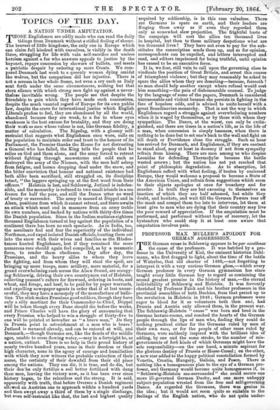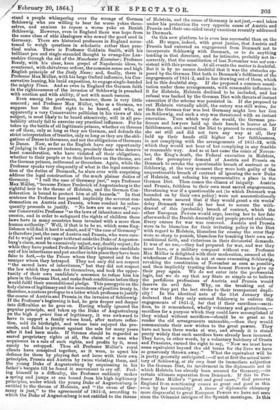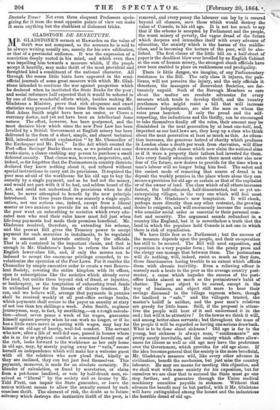PROFESSOR MAX MULLER'S APOLOGY FOR GERMAN AGGRESSION.
llE German cause in Schleswig appears to be par excellence the cause of the professors. It was hatched by a pro- fessor in the University of Kiel, the eminent historian Dahl- mann, who first dragged to light, about the time of the battle of Waterloo, that old charter of 1460,—not forgetting to interpret it with a very curious German gloss,—which every German professor in every German gymnasium has since taught every little German boy to regard as containing the second greatest promise in the history of man,—the eternal indivisibility of Schleswig and Holstein. It was fervently cherished by Professor Feick and his brother professors in the provincial assemblies of both Dachies, from that period up to the revolution in Holstein in 1848; German professors were eager to bleed for it as volunteers both then and, had Prussia and Austria only allowed them, in the present war. The Schleswig-Holstein " cause " was born and bred in the German lecture-rooms, and reached the hearts of the German people through the lips of men who, finding they could do nothing practical either for the Germans ruled by men of their own race, or for the people of other races ruled by Germans, were suddenly inspired with the brilliant idea of adding, by one and the same stroke to the number of mis- governments of both kinds of which stroke, might have the sole responsibility—on the one hand, a minute aspirant for the glorious destiny of Prussia or Hesse-Cassel; on the other, a new star added to the happy political constellation formed by Venetia, Croatia, Hungary, Galicia and Posen. There is nothing like a homogeneous plan to the eye of a German pro- fessor, and Germany would become quite homogeneous if, in "Schleswig-Holstein sea-surrounded" she, could secure one more ill-governed German Duchy, and one more unhappy subject-population wrested from the free and self-governing Danes. As regarded the Germans, there was genius in the idea; but it would not seem quite so suitable to the feelings of the English nation, who do not quite under-
stand a people whimpering over the wrongs of German Schleswig who are willing to bear far worse yokes them- selves, and anxious to impose a worse yoke on Danish Schleswig. However, even in England there was hope from the same class of able idealognes who sowed the good seed in Germany. There are historical professors in England accus- tomed to weigh questions in scholastic rather than prac- tical scales. There is Professor Goldwin Smith, with his brilliant pen and single-stranded thought to evangelize Lan- cashire through the aid of the Manchester Examiner; Professor Beesly, with his clear, keen gospel of Napoleonic ideas, to counteract, with chivalrous ardour, the common sense and high English principle of the Daily Hews; and, finally, there is Professor Max Muller, with his large Oxford influence, his Con- servative leaning, his lucid exposition, to engage single-handed the mighty Times. And so even in England the German faith in the righteousness of the invasion of Schleswig is preached with unction and with ability, if not with much success.
Even among the professors, however, there is very little concord ; and Professor Max Muller, who as a German, we suppose has the first right to be heard, and who, as apparently a very Conservative politician in his views of this subject, is most likely to be heard attentively, will in all pro- bability utterly fail to exercise any practical influence. For he takes up the battle of all legitimate princes, whether on thrones or off them, only so long as they are German, and defends the strict interpretation of treaties, only so long as they are the obli- gations of Danes to Germans, and not the obligations of Germans to Danes. Now, as far as the English have any opportunity of judging in the present instance, precisely those who deserve least consideration, who have violated all their obligations, whether to their people or to their brothers on the throne, are the German princes, enthroned or throneless. Again, while the Professor speaks very eloquently of what is the legal construc- tion of the duties of Denmark, he slurs over with surprising address the legal construction of the much plainer duties of Germany. "I call the case of Germany just," says Professor I2lax Miller, "because Prince Frederick of Augustenburg is the rightful heir to the throne of Holstein, and the German Con- federation is bound to protect him at all hazards." In that sentence the Professor has passed implicitly the severest con- demnation on Austria and Prussia, whose conduct he subse- quently proceeds to justify. "No laws are so sacred," says our Conservative Professor "as the laws of inheritance and suc- cession, and in order to safeguard the rights of children these laws have in many countries been invested with a more than human authority." Well, if that is to be so, which some Eng- lishmen will find it hard to admit, and if "the case of Germany" is therefore just, the case of Austria and Prussia, who were care- ful to weigh and yet eager to thrust asidethe Duke of Augusten- burg's claim, must be excessively unjust, nay, doubly unjust; for while they have pushed Professor Miller's legitimate candidate out of his inheritance and put another in his place theyhave been false to both,—to the Prince whom they ignored and to the usurper whom they betrayed. They not only did not respect "the sacred laws of inheritance," but they did not respect the law which they made for themselves, and took the oppor- tunity of their own candidate's accession to refuse him his place in the German Diet, and make fresh conditions before they would fulfil their unconditional pledge. This panegyric on the holy claims of legitimacy and the sacredness of positive treaty is, therefore, a curious prologue to a letter which professes to justify the course of Austria and Prussia in the invasion of Schleswig. If the Professor's beginning is bad, he gets deeper and deeper into difficulties as he goes on. Having wholly ignored the popular principle, and taken up the Duke of Augustenburg on the high a priori line of legitimacy, it was awkward to have to support a family whose head, after mature reflec- tion, sold its birthright, and whose heir enjoyed the pro- ceeds, and failed to protest against the sale for many years after it had been made. If thrones should be regarded as sacred proprietary rights at all, the claim of a man who acquiesces in a sale of such rights, and profits by it, must surely be estopped. Thus all Professor Miiller's royal clients have conspired together, as it were, to upset his defence for them by playing fast and loose with their own principles, Prussia and Austria by twice violating them, and the young Duke of Augustenburg by acquiescing in his father's bargain till he found it convenient to cry off. Feel- ing himself in a difficulty, the Professor suddenly makes a spring and jumps at one bound from his high legitimacy principle?, under which the young Duke of Augustenburg is entitled to the throne of Holstein, and "the cause of Ger- many is just," to the agreementst of 1851-2, according to which the Duke of Augustenburg is not entitled to the throne
of Holstein, and the cause of Germany is not just,—and takes under his protection the very opposite cause of Austria and Prussia and their one-sided treaty exactions recently addressed to Denmark.
On this new platform he is even less successful than on the old. He urges, indeed, with great justice, that Austria and Prussia had extorted an engagement from Denmark not to incorporate Schleswig with Denmark, or to do anything tending in that direction, and he intimates, probably not in- correctly, that the constitution of last November was not con- sistent with this promise. At all events the matter is doubtful. But it is by no means doubtful that it was the obstacles op- posed by the German Diet both to Denmark's fulfilment of the engagements of 1851-2, and to her drawing out of them, which led to this doubtful step. If she proposed a common consti- tution under those arrangements, with reasonable influence in it for Holstein, Holstein declined to be included, and her refusal was backed by the German Diet with threats of instant execution if the scheme was persisted in. If she proposed to cut Holstein virtually adrift, the outcry was still worse, for then the German fear was lest Germany might lose her lien on Schleswig, and such a step was threatened with an instant execution. Turn which way she would, the German pro- fessors and lawyers held up their hands in horror at her faithlessness, and moved the Diet to proceed to execution. If she sat still and did not turn any way at all, they held up their hands still higher at her faithlessness, in not complying with the arrangements of 1851-52, with which they would not hear of her complying in any feasible or reasonable way. And so at last came the crisis of Novem- ber, the King's death, the Federal execution in Holstein, and the peremptory demand of Austria and Prussia on Denmark to revoke the questionable breach of contract as to Schleswig, at the very moment they were both guilty of the unquestionable breach of contract of ignoring the new Duke of Holstein, and refusing his representative a place in the German Diet. Then comes the climax of iniquity. Austria and Prussia, faithless to their own most sacred engagements, threatening war if a questionable act (to which Denmark was hounded on by their own policy) were not unconstitutionally undone, were assured that if they would grant a six weeks' delay Denmark would do her best to secure the with- drawal of this (probable) breach of contract, which the other European Powers would urge, leaving her to her fate afterwards if the Danish Assembly and people proved stubborn. Every excuse for war was removed. Austria and Prussia were to be blameless for their irritating policy in the Diet with regard to Holstein, blameless for causing the error they were so sharp to punish, blameless for breaking their own un- conditional faith, and victorious in their dictatorial demands. It was of no use,—they had prepared for war, and war they must have, or a military conquest without war. Professor Max Muller is delighted with their moderation, amazed at the wickedness of Denmark in not at once evacuating Schleswig, revoking the constitution of November as soon as possible, and then implicitly trusting these honest Powers to give up their prey again. We do not enter into the professorial logic, but we do say that any State so simple as to believe the perfidious professions of Austria and Prussia would deserve its evil fate. Why, on the breaking out of the war they put the last stroke to their transparent dupli- city! In the identical note of the 31st January they declared that they only entered Schleswig to enforce the engagements of 1851-2, but that if their sacrifices—sacri- fices, be it remembered, wholly voluntary and gratuitous,— sacrifices for a purpose which they could have accomplished if they wished without sacrifices—should be so great as to render the old arrangements untenable,—then they would communicate their new wishes to the great powers. They have not been three weeks at war, and already it is stated pretty widely that such sacrifices have already been incurred. They have, in other words, by a voluntary butchery of Croats and Prussians, earned the right to say, "Now we must have some equivalent beyond the old terms for the lives we have so generously thrown away." What the equivalent will be is pretty generally anticipated :—if not at first the actual terri- tory of Schleswig, at the very least its immediate subjection to the German Diet, its involvment in the diplomatic net in which Holstein has already been secured for Germany,—its certain ultimate separation from Denmark. If this be Pro- fessor Max Miller's "great and good cause," God preserve England from sanctioning causes so great and good as this even by her neutrality! A tissue of diplomatic chicanery more disgraceful to great European Powers we have not seen since the Orleanist intrigue of the Spanish marriages. Is this
































 Previous page
Previous page